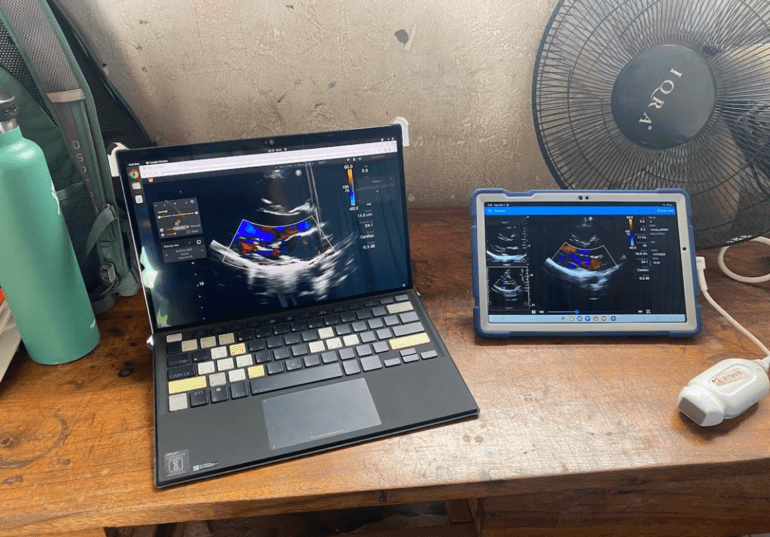TL;DR:
- AI-powered tool developed by Children’s National Hospital aids in early diagnosis of rheumatic heart disease (RHD) in children.
- RHD is a preventable illness resulting from repeated bouts of rheumatic fever, with limited early detection capabilities in resource-limited regions.
- The AI system interprets echocardiogram images with nearly 90% accuracy, providing timely diagnoses.
- Affordable and lightweight technology promises to democratize RHD screening in underserved areas.
- Ongoing testing and refinement in Uganda aim to improve the algorithm’s reliability.
- Approval could enable nurses to identify potential RHD cases, reducing the need for long-distance travel and invasive surgeries.
Main AI News:
In the world of modern medicine, doctors and researchers are continually striving to harness the power of artificial intelligence (AI) to address pressing healthcare challenges. One remarkable example of this ongoing effort is the groundbreaking AI-powered tool developed by researchers at Children’s National Hospital, Washington, in collaboration with the Uganda Heart Institute. This innovative technology is poised to transform the early diagnosis of rheumatic heart disease (RHD) in children, ultimately saving countless lives and reducing the burden of this devastating condition.
RHD is a largely preventable illness that stems from repeated episodes of rheumatic fever, triggered by group A streptococcus bacteria, a global health concern causing an estimated 600 million strep throat infections annually. While only a minority of those infected with the bacteria develop RHD, environmental factors, such as poor living conditions, play a significant role in its development. Typically, the disease manifests its first symptoms in children between the ages of 8 and 10, but early detection remains a challenge due to the shortage of cardiologists in countries like Uganda.
Traditionally, diagnosing RHD required specialized equipment and expertise, making widespread screening impractical in resource-limited settings. However, the AI-powered system developed by Children’s National and its partners offers a game-changing solution. This lightweight, cost-effective technology, expected to be available at a fraction of the cost of traditional echocardiogram machines, has the potential to democratize early diagnosis. By using AI to interpret echocardiogram images in a matter of seconds, the tool classifies them as either “normal” or indicative of RHD with an impressive accuracy rate of nearly 90%.
AI’s remarkable capacity to improve image accuracy promises to revolutionize healthcare delivery, particularly in underserved regions. Chris Longenecker, director of the Global Cardiovascular Health Program at the University of Washington, emphasizes the transformative potential of AI-enhanced ultrasound, especially in remote areas with limited resources. The technology not only enhances diagnostic accuracy but also provides invaluable insights into the critical characteristics of RHD.
This promising AI system is currently being tested and refined through an extensive program in Uganda, involving up to 200,000 pediatric cases. The majority of this data will be used to further train and improve the algorithm, ensuring its reliability and effectiveness in real-world healthcare settings. Pending approval from regulatory authorities in Uganda and the United States, trained nurses equipped with a probe and tablet containing the AI component could soon identify potential RHD cases with ease, reducing the need for patients to travel long distances for specialist consultations.
Shelby Kutty, director of pediatric congenital cardiology at Johns Hopkins Children’s Center, lauds this groundbreaking research as a significant step forward in pediatric heart disease detection. With AI technology on their side, medical professionals can now address this global health issue more effectively, providing early treatment and ultimately sparing children from the need for costly and invasive surgeries. As the field of AI in healthcare continues to evolve, the possibilities for improving global health outcomes are limitless, giving hope to countless individuals like Mohammed, the Ugandan teenager whose life was forever changed by this innovative technology.
Conclusion:
The development of an AI-powered tool for early RHD detection represents a significant advancement in pediatric healthcare. This innovative technology not only saves lives but also addresses a major global health issue. Its potential to make early diagnosis accessible in resource-limited regions could open up new market opportunities for affordable healthcare solutions, especially in developing countries where RHD remains a significant concern. Moreover, it highlights the transformative role of AI in improving healthcare outcomes and reducing healthcare disparities worldwide.

